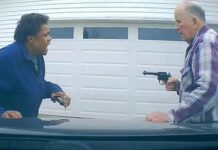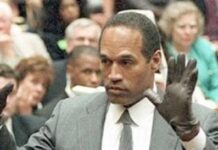
*Award-winning director Delila Vallot takes an in-depth look at how African American homeless people are treated in our country with her latest documentary Mighty Ground.
The film, which also explores our broken system of race and economic class, follows homeless singer Ronald Troy Collins as he struggles with drug addiction and hustling to survive day-to-day by singing to people on the streets of downtown Los Angeles.
Watching the film, I was reminded of my estranged uncle who seems to prefer the vagabond life. My family lost contact with him nearly two decades ago when he moved out-of-state. Then about 4-5 years ago, some random stranger tracked us down to inform us that he had found my uncle living on the streets in Florida. My uncle was a subject in this stranger’s indie film. I don’t recall the theme of the project, but I do know that my uncle has an amazing gift for sculpting damn near ANYTHING, so I believe his exceptional creative talent was a talking point in the film. Something along the lines of, “Why aren’t you putting this extraordinary gift to use instead of living on the streets?”
Seeing my uncle on this stranger’s YouTube video was quite comforting for the family. To us, he looked clean, healthy, happy, comfortable, safe, coherent — things you wouldn’t typically expect from a homeless individual. We wanted him to come home and the filmmaker offered to cover all his travel expenses. But my uncle turned it down because his “home” was whatever city park that random curious dude with a camera found him chilling at every day.
Growing up, my uncle was the most eccentric of the family. So while we were gutted about his refusal to come back to Chicago — most especially to see his parents and siblings — we decided not to press the issue because we concluded that he preferred to be homeless. Again, he’s a vagabond at heart.
“I think that we hear that a lot, especially when someone is out on the street for a while. They go, ‘Yeah, I wanna be out here.’ But if given the choice, most people would choose a home,” Vallot said upon hearing this story about my uncle.
EUR/Electronic Urban Report caught up with the filmmaker to discuss Mighty Ground, which premiered at the Los Angeles Film Festival last month. Vallot hopes the doc inspires the type of conversation that invokes change all around. Check out below what she had to say regarding the common misconceptions about the homeless.
OTHER NEWS YOU MIGHT HAVE MISSED: EURweb Speaks with ‘The Most Interesting Man in The World’ (LISTEN)

Describe the creative process behind capturing Ronald’s unique story for this traditional entertainment audience.
Delila: My team and I, we wanted to humanize homelessness and explore for ourselves what the problem is in a civilized society. Why do we have so many people on the street and why is it a growing crisis? We tried to get in there and understand it and then share with America our findings. It was supposed to be a series initially, where I was going to go from American city to American city to do mini biographies and my producer was out one evening in downtown L.A. and she met Ronald and was really knocked over by him. We decided to follow him and he was going to be our first subject but it turned out that there was so much more to his story. And also, I realized that I couldn’t immerse myself with even one more person in one more homeless community again. I didn’t have the emotional capacity to do that. So for those two reasons it became a feature.
Talk about your distribution journey so far and what it means to have the film premiere at the L.A. film festival.
Delila: The Los Angeles Film Festival is a really great supportive film festival to premiere at because a lot of other festivals sorta get word that you premiered there, at least, this was my experience with my last documentary. And it sorta gives you a push forward in a sense to be able to travel around the country to other film festivals and share the film with people before it opens. And it’s also a place where we’ve been able to screen the movie to distributors, two of them we are talking to. So we’re planning on doing the festival route nationally and then open the movie and we’ll probably look to do some sort of cable television and also VOD release. And also, what I’m really excited about are community screenings and organizations across the U.S whose focus it is to help eradicate homelessness and perhaps even centers where homeless people might be temporally residing where they could look at the movie and hopefully gain some hope and strength from watching it. Or also, people that work with the homeless that might be able to watch it and help strengthen their cause.
This doc explores the idea that homelessness is also a health care issue, and you discovered that there is a class and race system in place about who receives benefits. What impact does Trump’s administration have on the homeless community getting access to health care?
Delila: It seems to be going in the opposite direction that we would hope that it would. But to me, the good news is, our local governments are something that we have a lot more access to and where we can make the bigger changes. It’s kinda one of those think globally act locally type of situations. I learned that what happens is when you’re out on the street, this sort of old system of there being this big government building that you’ve got to get yourself to as a homeless individual. That’s old, antiquated thinking — that someone is going to be able to find the place and then when you get there, you have to wait several hours in a line before you even get into the building. Then you have to wait and sign-in then a few hours later you actually get to see a person who’s working at this big bureaucratic government entity who has several cases in front of him, can’t give you any sort of personal attention, tries to figure out what your problem is. Then they give you an appointment to come back in two months. Two months is too late. Somebody who is living on the street and might have physical ailments or be mentally disabled, might be struggling with addiction, what are they going to use to know which date on the calendar that is in two months to return to that same building? That’s the system that we have that is being funded.
We need to figure out how to incorporate some of the growing systems that we know are actually helping. One of them is called Housing First, and it started in New York City. It’s my understanding that New York City has several laws in place where you can’t leave someone out on the street. You’ve got to house them. So it’s taken us about 20 years to sorta follow in the same footsteps here in Los Angeles, but the idea is that you put someone in the house first and ask questions later. It actually cost the tax payer less money to house people. We’re paying tax dollars to leave people out on the street.

Most of us have a vivid imagination about what kind of person a homeless individual might be. What did you discover while making this film? What are some of the misconceptions about the homeless community?
Delila: What I learned from being out there and also from being lucky enough to interview some of the amazing experts that spend their lives down there working on the cause, is that, a huge portion of the people that are experiencing homelessness are mentally and physically disabled. So that begs the question, what are we doing? Why are we leaving people, who aren’t capable of taking care of themselves because of a disability, on the street? And then a lot of people experience an event that puts them out on the street and if they’re not able to recover within the first week or two, it becomes much more difficult to get themselves off the street. I think people think that you have nothing to do all day (so) find a shower, get into an internet cafe and look for a job. But that’s a misconception that I’m also still trying to wrap my head around because it makes sense. It seems like someone would have all day to fix the problem but survival mode on the street is a lot more difficult than any of us can imagine. And it could take you all day to get food and a shower.
Another thing that happens while you’re out there, you were mentally stable before you were on the street, nine times out of ten, you’re going to walk away with some sort of disability because of trauma that you might experience and also because it’s not hygienic and it’s also violent and dangerous. And another thing is that there are a growing number of women and children that are experiencing homelessness now more than ever before. Also, specifically in Los Angeles, a great number of the people that are living on Skid Row come from South Los Angeles, which is an area that is primarily a black neighborhood. These are people that are our friends and neighbors that have been down on their luck. Maybe you and I have one person that we can call when we’re down on our luck but what happens is, people either don’t have that support group and they fall through the cracks.
There’s a lot of things that could lead to someone ending up on the street but the other thing I’d like to add is that, I know you said that your uncle was living down there by choice and I think that we hear that a lot, especially when someone is out on the street for a while, they go, ‘Yeah, I wanna be out here.’ But if given the choice, most people would choose a home. It’s somewhat of a defense mechanism because we all do that. We try to make light of our situations but most of them have experienced some sort of trauma that leads them out there or one event where they slip through the cracks, or mentally and physically disabled. It’s not like someone just got lazy and they’re just living out there.
And the other misconception is that, we go about our day and we see someone who’s out on the corner visibly mentally ill, and we somehow imagine that something is going to happen to that person where they’re going to miraculously fix themselves and their own mental illness and then become a member of society without any help. And that’s not the case. When you see somebody out on the street who’s talking to themselves or having a real difficult time, they’re not going to get themselves off the street. The problem is growing. That’s why we’re seeing tent cities popping up all over the United States and part of it has to do with the cost of living. So for every $100 rent raise, we create a 15% increase in homelessness. A lot of people are getting forced out of their homes.
I don’t want to spoil it for our readers but the film’s surprise ending…. wow. What’s the status with Ronald today?
Delila: He’s still rocking out and he’s still clean and sober. Which is amazing. It’s sort of a vulnerable place to be in. To be in a documentary and know that great things can happen to him as an artist but that also he’s there as an example and as a means to help other people. I think he gets satisfaction from that but I also think that there’s a vulnerable place that he’s living in because music does mean so much to him. So in addition to working, he’s still working on his album. It’s all very personal to him.
What was most rewarding about going on this journey with Ronald?
Delila: I am glad that he is clean and that would be the most rewarding element to the story because when we jumped in, we didn’t have any clue how it would end. The sort of secondary story beyond homelessness. What I want to impart to people is that just a little bit of love… how profound of an impact that can make on someone’s life. And you get to see in the movie the various individuals who give in various ways, which isn’t always monetary. It might just be, ‘Come hang out with us and just forget your problems for a moment and just be human. I’m going to treat you like a fellow human being,’ and how much that can affect someone’s life. Cutting the movie together and seeing that it’s actually true is the most meaningful to me because I feel like, right now, we can use that in our world when there’s so much division and separatism. And to me, the most simple solution, as naive as it sounds, is leading with the heart. It’s very simple. Leading with the heart is always the best path in the world as we find it today.
What do you help people are left feeling and talking about after they watch Might Ground?
Delila: I hope when people watch the movie two things happen. One is that it will have an effect on them that when they see someone out on the street that they realize that it could be a Ronald but that it also could be someone’s mother, aunt, a sister, a brother, so it helps us to recognize that. The other aspect is that there’s sort of a third layer that’s going on because Ronald is a black man and he has created these very deep and loving relationships with white people. I know there’s parts of the country where there’s fear of black men and that’s why people might be getting shot and this system is so awry. And it seems really simple but I’m wondering if we need examples of this now. Here’s a homeless guy who is very dark skin with a crack cocaine addition that’s sleeping on this young, Millennial white girl’s floor because they’ve created a connection. So it’s like, if she can make friends with him, maybe you don’t have to fear a guy in a car because of the skin color that he has.
We Publish News 24/7. Don’t Miss A Story. Click HERE to SUBSCRIBE to Our Newsletter Now!





